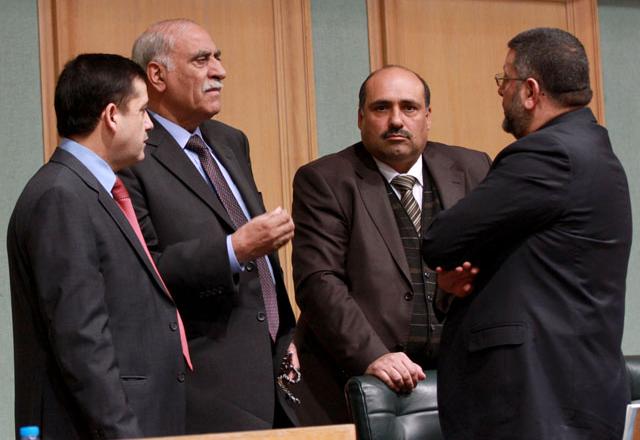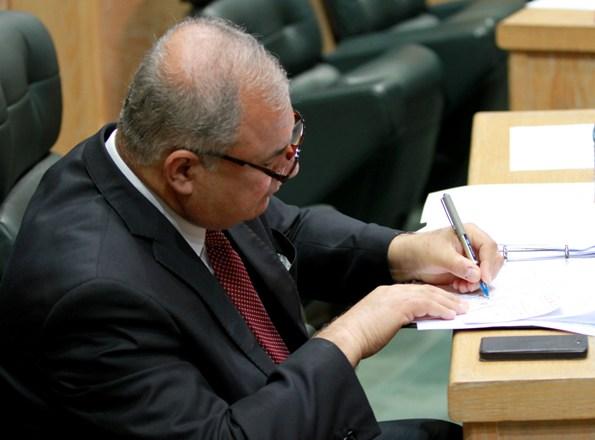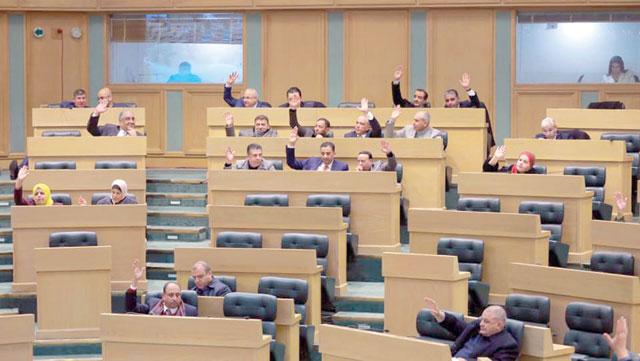You are here
House speaker urges restraint as MPs reject projected gas deal with Israel
By Raed Omari - Dec 16,2014 - Last updated at Dec 16,2014

AMMAN — A planned gas deal with Israel is causing considerable damage to relations between the executive and legislative authorities, as several deputies stand firm against any such cooperation and express readiness to fight it through various means.
Meanwhile, in the opposite camp in the Lower House of Parliament, there are MPs who call for reason and restraint in dealing with such a controversial issue, particularly as imported energy costs Jordan a quarter of its gross domestic product.
The anti-deal camp in the Lower House is threatening to initiate a motion of no confidence in the government of Prime Minister Abdullah Ensour if it imports natural gas from Israel. A 15-member group in this camp has threatened to resign en masse if any such deal is signed and almost 20 MPs have expressed their intention to start the motion of no confidence in the 150-strong House.
In a bid to balance this and correct what he described as "misconceptions", Lower House Speaker Atef Tarawneh noted that "it is illogical and unfair to press the government over a matter it has not yet decided on".
“The pledged no-confidence vote in the government should not be based on a planned deal that has not been signed yet,” Tarawneh told The Jordan Times on Tuesday.
“Once such a deal is officially signed, then deputies can see to the necessary reaction.”
Tarawneh also called on MPs to replace their current “roaring” anti-government sentiments with reason, arguing that “the government should not be cornered on the basis of intentions”.
As a unified body, the House has addressed the projected gas deal with logic and according to constitutional doctrines, the speaker explained, referring to last week’s sessions.
“We dedicated two sessions to discuss ISsue during which 107 MPs presented their remarks. The House then collectively recommended that the government shelve the planned natural gas deal.”
Tarawneh said the House proposed that the government look into alternative gas sources, including Palestine and Cyprus.
“All in all, once such a deal is signed, no one can prevent deputies from reacting the way they deem necessary. It is their constitutional right. But let’s wait and see.”
In a related development, a group of MPs announced Tuesday that they will resign en masse if the government insists on importing natural gas from Israel under a 15-year deal they described as “shameful and humiliating”.
In September, the government said the state-owned National Electric Power Company (NEPCO) and the US-based Noble Energy signed a deal under which NEPCO would buy 250-300 million cubic feet of natural gas per day from Noble Energy.
Last month, the government said that NEPCO’s losses have so far exceeded JD5 billion, and have been exacerbated by the disruption in natural gas supplies from Egypt.
The last time Jordan received gas from Egypt was in January when it stood at around 35 million cubic feet per day, a quantity which falls short of the 220 million cubic feet per day stipulated under a gas agreement signed between the two countries.
The decision to resign by a group of MPs belonging to various parliamentary blocs was taken following a meeting to discuss how to react once the deal is signed, according to Deputy Ali Sneid (Madaba, 2nd District).
“Prime Minister Abdullah Ensour’s government is challenging and neglecting the Lower House’s stand in its arbitrary insistence on the biggest shameful act in the Kingdom’s history,” Sneid told The Jordan Times.
“If the government goes ahead with the deal, we will resign. This is the least we can do in response to such a shameful action.”
The lawmaker said 15 MPs have signed the memorandum stating their intent to resign and other colleagues from various blocs will join in.
“We will hold a press conference at the House, where we will issue a collective statement carrying our irreversible and absolute resignation,” Sneid added.
In previous remarks to The Jordan Times, MP Mahmoud Kharabsheh (Balqa, 1st District) said there are “numerous” alternative gas sources the government can resort to other than Israel, accusing the government of “attempting to close all doors intentionally to pass the deal with Israel”.
“This is not sentiment, not accusation or indulgence in conspiracy theory. Jordan has natural gas reserves. I have documents proving that. Plus, the Algerians offered to provide us with natural gas at preferential prices. But no one is listening,” Kharabsheh claimed.
As president of the Jordanian-Algerian Parliamentary Friendship Committee, Kharabsheh said he received promises from the Algerians about their readiness to provide Jordan with natural gas either through the Egyptian pipeline or a floating gas terminal in Aqaba.
Responding to deputies’ criticism during last week’s session to discuss the deal, the premier said the government had requested the Algerians to provide Jordan with gas but they said: “We have no gas for sale.”
Ensour also said that MPs have the right to express their opinions regarding the intended deal, stressing at the same time that his government is “no less patriotic” than the Chamber and the wider public.
“I cannot accept having my history stigmatised with approving a deal that might harm Jordan and Jordanians. The government is here to serve the country and its interests,” he said.
Earlier this week, more than 20 MPs signed a memorandum requesting a motion of no confidence in Ensour’s government, primarily citing its incapability to run the state’s affairs.
Kharabsheh, who authored the memorandum, said the government’s insistence on resorting to price hikes as the only remedy for financial problems was another major reason behind the call for a no-confidence vote.
Related Articles
Lawmakers on Wednesday recommended that the government shelve a planned natural gas deal with Israel following two long sessions dedicated to discussing the controversial issue.
AMMAN — The Lower House on Sunday announced that it will hold a monitoring session on January 19 to discuss the controversial deal between t
Lawmakers on Tuesday expressed their staunch opposition to planned natural gas imports from Israel during a session dedicated to discuss the issue, while others defended the deal as a realistic option.













